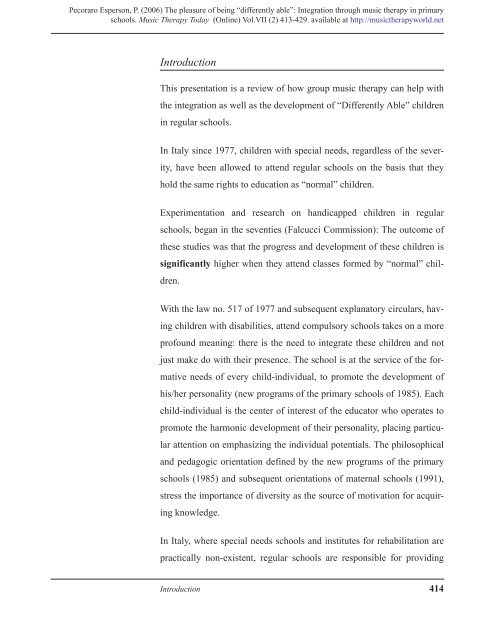Music Therapy Today - World Federation of Music Therapy
Music Therapy Today - World Federation of Music Therapy
Music Therapy Today - World Federation of Music Therapy
Create successful ePaper yourself
Turn your PDF publications into a flip-book with our unique Google optimized e-Paper software.
Pecoraro Esperson, P. (2006) The pleasure <strong>of</strong> being “differently able”: Integration through music therapy in primary<br />
schools. <strong>Music</strong> <strong>Therapy</strong> <strong>Today</strong> (Online) Vol.VII (2) 413-429. available at http://musictherapyworld.net<br />
Introduction<br />
This presentation is a review <strong>of</strong> how group music therapy can help with<br />
the integration as well as the development <strong>of</strong> “Differently Able” children<br />
in regular schools.<br />
In Italy since 1977, children with special needs, regardless <strong>of</strong> the sever-<br />
ity, have been allowed to attend regular schools on the basis that they<br />
hold the same rights to education as “normal” children.<br />
Experimentation and research on handicapped children in regular<br />
schools, began in the seventies (Falcucci Commission): The outcome <strong>of</strong><br />
these studies was that the progress and development <strong>of</strong> these children is<br />
significantly higher when they attend classes formed by “normal” chil-<br />
dren.<br />
With the law no. 517 <strong>of</strong> 1977 and subsequent explanatory circulars, hav-<br />
ing children with disabilities, attend compulsory schools takes on a more<br />
pr<strong>of</strong>ound meaning: there is the need to integrate these children and not<br />
just make do with their presence. The school is at the service <strong>of</strong> the for-<br />
mative needs <strong>of</strong> every child-individual, to promote the development <strong>of</strong><br />
his/her personality (new programs <strong>of</strong> the primary schools <strong>of</strong> 1985). Each<br />
child-individual is the center <strong>of</strong> interest <strong>of</strong> the educator who operates to<br />
promote the harmonic development <strong>of</strong> their personality, placing particu-<br />
lar attention on emphasizing the individual potentials. The philosophical<br />
and pedagogic orientation defined by the new programs <strong>of</strong> the primary<br />
schools (1985) and subsequent orientations <strong>of</strong> maternal schools (1991),<br />
stress the importance <strong>of</strong> diversity as the source <strong>of</strong> motivation for acquir-<br />
ing knowledge.<br />
In Italy, where special needs schools and institutes for rehabilitation are<br />
practically non-existent, regular schools are responsible for providing<br />
Introduction 414

















